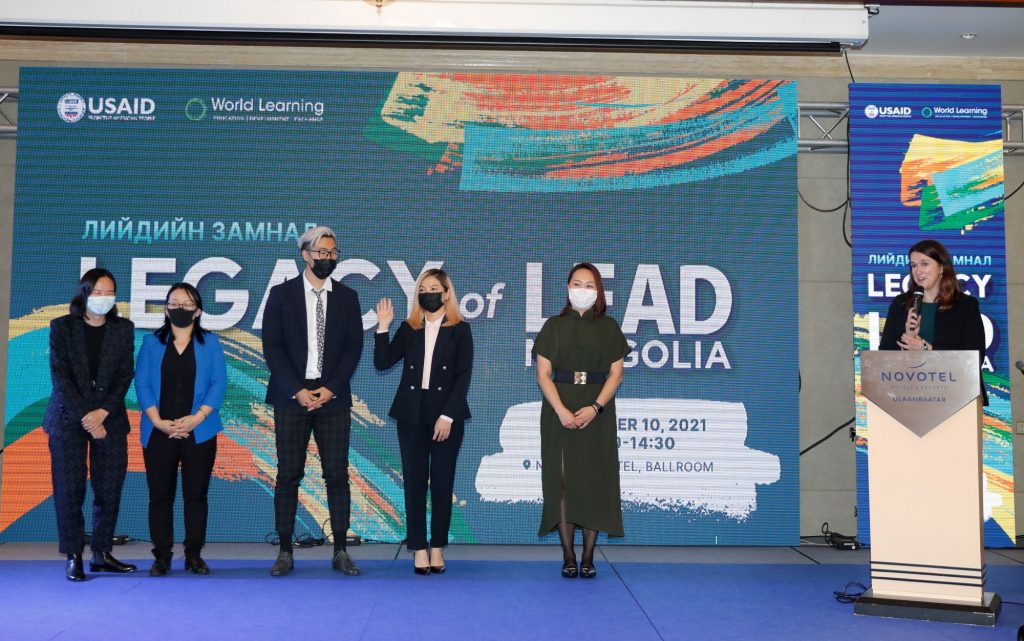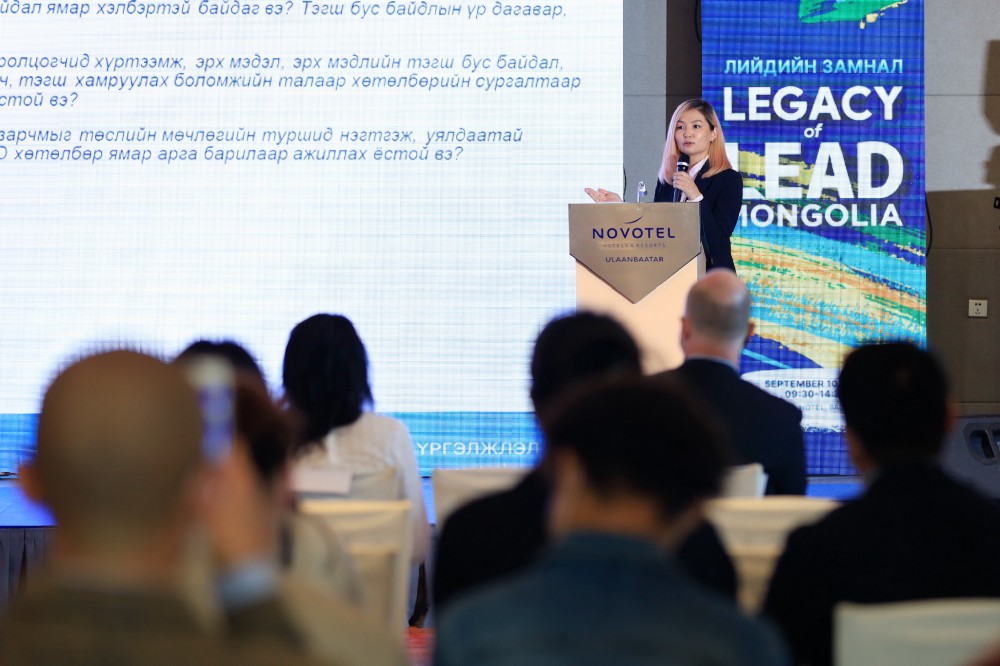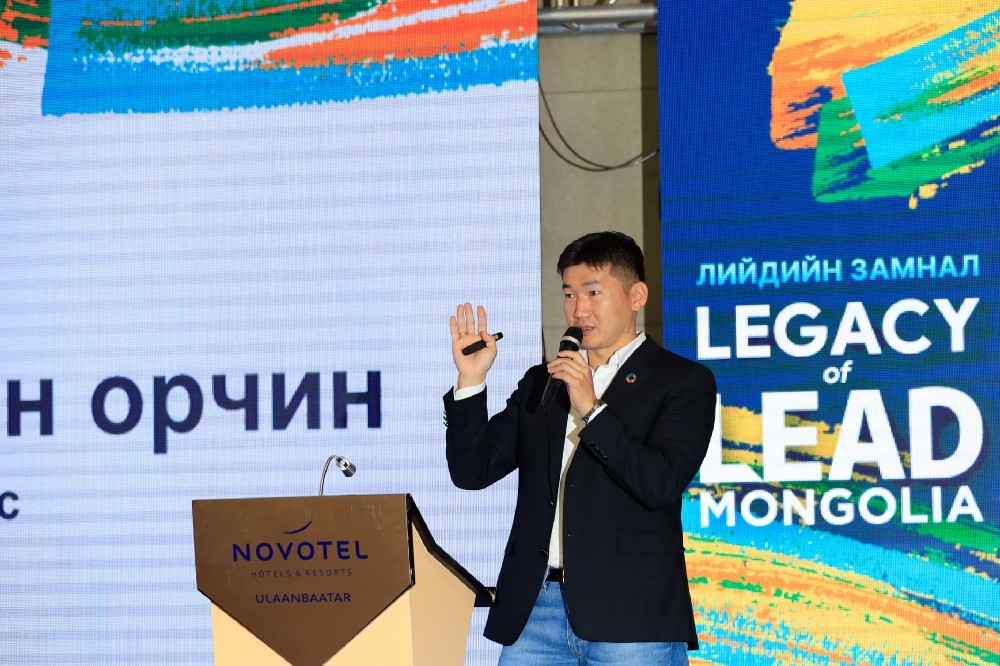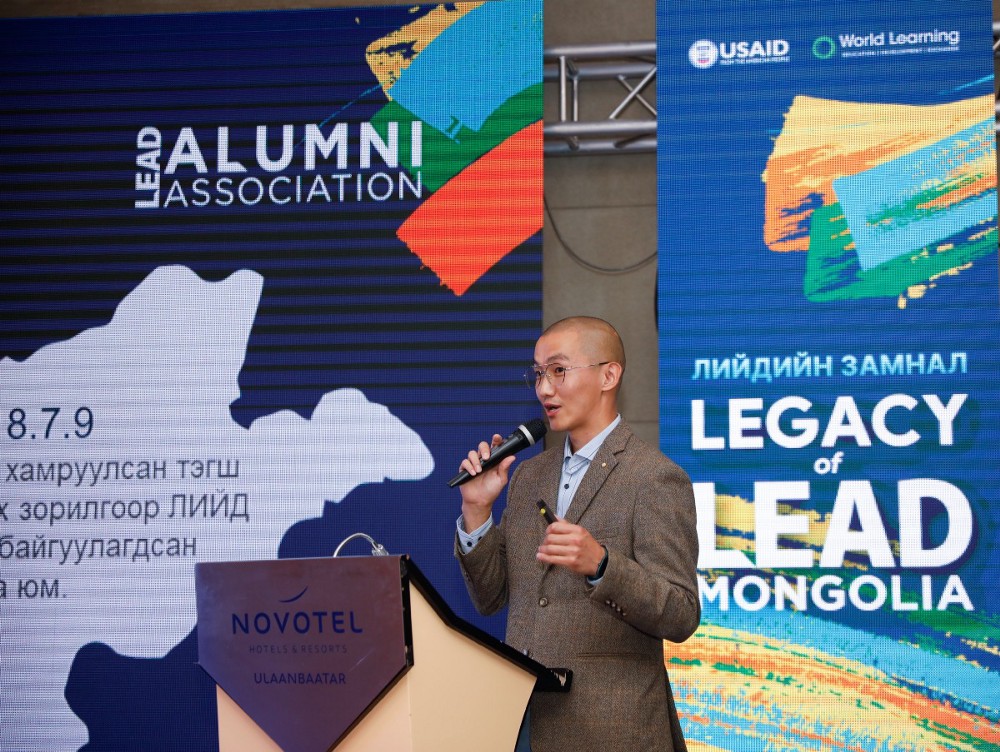-
What We Do
- WHERE WE WORK
-
About Us
 Welcome Message from Carol Jenkins
Welcome Message from Carol JenkinsFor more than 90 years, World Learning has equipped individuals and institutions to address the world’s most pressing problems. We believe that, working together with our partners, we can change this world for the better.
On my travels, I’ve had the opportunity to meet with many of those who have joined us in this mission. In Baghdad, we’ve trained more than 2,300 Iraqi youth who are already giving back at home. In London, our partners in the TAAP Initiative strongly believe that we are all responsible to practice inclusion. And in Vermont, our Experiment in International Living and School for International Training participants prove every day that they have the tools and the determination to change the world.
Please join us in our pursuit of a more peaceful and just world.
- Get Involved
Media Center > Story
Supporting Inclusive Development in Mongolia: The Legacy of LEAD
October 15, 2021

By Munguntuya Otgonjargal, Senior Program Officer, and Meghan Burland, Chief of Party, Leaders Advancing Democracy (LEAD) Mongolia
Inclusion has always been at the forefront of World Learning’s approach to creating a more peaceful and just world, and its USAID-funded Leaders Advancing Democracy (LEAD) Mongolia program has been no exception. From the program’s inception in 2016, LEAD has prioritized inclusion as one of the hallmarks of its programming — from the initial program design to outreach and implementation. Now, five years later, the LEAD Mongolia program has just concluded, after supporting thousands of young people in gaining new knowledge and skills in democracy, advocacy, civic engagement, and social inclusion.
On September 10, World Learning hosted the “Legacy of LEAD” event in Ulaanbaatar to highlight the LEAD program’s legacy with an official launch of the Mongolian version of the World Learning “Transforming Agency, Access, and Power” (TAAP) Toolkit. The TAAP Toolkit, originally launched in 2018, is an interactive guide for more inclusive development to amplify the voices, opportunities, and dignity of all people.
With five years of successes and lessons learned, the World Learning Mongolia team aimed to showcase the achievements of the program and provide a useful resource for the development community in Mongolia. The Mongolian translation will serve as an invaluable resource for development practitioners, civil society, the private sector, and government officials across the country. During the September 10 event, World Learning staff and LEAD program alumni highlighted the importance of inclusion and shared real-life examples of how the TAAP Toolkit can be utilized to ensure that all people have a voice in their community or workplace.
Why Inclusion Matters
In August 2016, World Learning staff carried out a Transforming Agency, Access, and Power (TAAP) assessment in Mongolia, paving the way to create an inclusive design for the program and new opportunities for social inclusion over the project’s lifecycle. Before, during, and after this assessment, World Learning met with dozens of individuals and organizations, with a particular focus on gender, disability, LGBTI, youth, rural and nomadic populations and Kazakh minority community members. Not only did these meetings and discussions inform the design of the LEAD program, but they also provided important insights and connections that proved essential to ensuring LEAD had representation from diverse groups.

LEAD’s Deputy Chief of Party, Khulan Dashpuntsag, recalled initial stakeholder meetings during these very early days of the program in 2016. She remembers visiting with members of the deaf community and learning that they were not often consulted on issues that directly affected their daily lives; for example, School №29 in Ulaanbaatar, a school for deaf and hard-of-hearing students, had bells to denote the end and beginning of classes. Most students and teachers could not hear these bells, yet nothing had been done to provide a solution. Through the civic education component of the LEAD program, students and teachers at School №29 worked together with stakeholders to install a lights-based system at the school, which was more suited to students’ and teachers’ needs.
This story and countless others like it demonstrate the importance of inclusion, ensuring that a variety of voices are heard, and that community members have a say in what happens in their own lives. This belief is what drove the World Learning team to incorporate inclusive development practices throughout the LEAD Mongolia program, from design to applications and outreach to technical content.
TAAP In Practice
During the “Legacy of LEAD” event, several alumni of the LEAD program shared how they have used the TAAP Toolkit and inclusive development methods in practice in their professional lives. The alumni came from civil society, the private sector, and government, emphasizing how these methods can be used across sectors to strengthen organizations and promote inclusive practices.
“I hope this approach will open up opportunities for people to participate in civic action.”
LEAD 2019 US Exchange Program Fellow Purevjav Tumendemberel is currently a project officer for the Mongolian Youth Council, a non-governmental organization that empowers young people to become active citizens and leaders. While he noted that civil society organizations can sometimes lose sight of inclusive processes when focusing on the end results of a project, he emphasized the versatility of the TAAP Toolkit in countering this tunnel vision, as the toolkit can be utilized at various stages of development and program planning. “I hope this approach will open up opportunities for people to participate in civic action,” he stated.
Although many people would not think of the private sector when they hear the term ‘inclusive development,’ LEAD 2018 US Exchange Program Fellow Telmen Gerelt explained how inclusive practices can be successfully implemented in the private sector, particularly in relation to hiring and staff development. As the Chief Executive Officer at ARD Credit, Telmen spoke of using TAAP practices to ensure that a variety of his staff’s voices were being heard and that the company’s hiring and human resources practices became more inclusive.

Telmen highlighted updating human resources policies at Mongol Post (a company with over 2,000 employees) to make them more inclusive. For example, the policy changes aimed to reduce or eliminate ways in which women were sometimes discriminated against in workplace hiring processes due to time out of the workforce to raise their children. He also spoke about efforts to improve mechanisms for employee input and feedback in decision-making of the company.
“I want more people to use the TAAP Toolkit, as I have experienced firsthand the positive results that can be achieved. I especially urge the private sector to use this toolkit because when the employees feel included and heard and when the workplace is equally inclusive, employers benefit more,” Telmen said.
Bulganchimeg Bayasgalant, Deputy Director of the National Development Agency and LEAD 2016 US Exchange Program alumna, spoke of the importance of government agencies implementing inclusive practices like those found in the TAAP Toolkit. She used the four phases of TAAP to explain how government agencies can be more inclusive, from initial analysis to inclusive design and implementation. Bulganchimeg provided several examples, including an internship program at the NDA designed to help youth gain more practical work experience and a one-month capacity building program for Mongolian start-ups.
“At the end of the day, we’re trying to broaden our perspectives through this toolkit as everyone is different,” she summarized.
Inclusive Development from Start to Finish: The LEAD Mongolia Experience
LEAD Mongolia became the first project to commit to the TAAP approach to embed inclusion sensitivity in all aspects of the project life cycle. During the past five years, the LEAD Mongolia program integrated all five core TAAP principles throughout its design, implementation, and accountability mechanisms.
After the initial assessment in 2016, three key recommendations were developed:
1. Expand the program’s original target groups to also include the Kazakh ethnic group and internal migrants. Based on this recommendation, the program team strategized and budgeted our program outreach to hold information sessions at locations that are accessible and welcoming for these groups.
2. Consciously focus on deepening participants’ understanding of and sensitivity to the concepts and patterns of inclusion, marginalization and exclusion, and inclusive development across project components. With this in mind, the team designed program content to include at least two technical sessions on diversity and inclusion for each LEAD Mongolia cohort. Through these sessions, participants increased their understanding of inclusion in their communities and were able to initiate projects that improve the overall inclusive environment and awareness in their professional and personal lives.
3. Finally, the assessment found that an inclusive, creative, and ongoing communication strategy is the key to reaching the greatest number of people from diverse backgrounds. All of LEAD’s content was mindfully created with inclusive aspects, such as videos including sign language and/or subtitles and Kazakh subtitles, as well as having image posters with separate texts for the blind community, among other efforts.
Over the years, LEAD Fellows equipped with new inclusion skills have implemented some incredible initiatives within their communities. One of the latest examples is from LEAD 2017 US Exchange Program alumnus, Bekbolat Bugibay. Bekbolat lives in Bayan-Ulgii province, the only Kazakh majority province in Mongolia. He recently finished building a girls’ dormitory for the Bayan-Ulgii branch of Khovd University. Since it is a university for the entire western region, many female students arrive with no place to live and are prone to various challenges. He recognized this issue and started raising funds to build a dormitory for those students, who otherwise would have not been able to get a quality education due to their circumstances. Of the project and the role his LEAD experience played, he said, “The LEAD program had the great advantage of providing equal opportunities to all young people regardless of their background, ethnicity, or where they work or where they live. Advocacy for youth through youth representation was the best approach.”
Stories like Bekbolat’s reminds us why we do what we do and how important it is to keep working to include everyone’s voices. Building a fully inclusive society takes time, and everyone’s effort is instrumental. However, if society can continue to be mindful and open to more inclusive processes, great progress can be made.
The Legacy of LEAD
The Mongolian version of the TAAP Toolkit can be found here.
As Khulan explains, “While the LEAD Mongolia program may be ending, the TAAP Toolkit can continue to be a resource for the development community here for years to come. This is truly one of the legacies of LEAD.”

Launched in September 2016, LEAD Mongolia was a five-year leadership development program — funded by the U.S. Agency for International Development (USAID) and implemented by World Learning — that exposed 246 emerging Mongolian leaders to best practices in democracy and good governance, strengthening their ability to advocate for their communities and engage with policymakers. Since its inception, the LEAD program has focused on developing a strong network of young Mongolian democracy advocates who have a unique vision and desire to create positive change in their communities. These changemakers have implemented 26 civic action projects over five years, focusing on LEAD Mongolia’s key policy themes of poverty alleviation and unemployment, environment and urbanization, and transparency and anti-corruption.
Through its partner, the International Republican Institute, the program has also connected young Mongolians with their counterparts in Bhutan, Kyrgyzstan, and Myanmar, highlighting Mongolia’s peaceful democratic transition as an example in the region. The civic education component, implemented by the Center for Citizenship Education, developed and introduced civic education curriculum for teachers and students at the high school level in Ulaanbaatar and all 21 aimags.
LEAD brought together students and young professionals representing different sectors and experiences to take part in civic advocacy and leadership training, exchanges, and community action planning, all aimed at fostering a strong network of young democracy advocates across the country.
The contents of this article are the responsibility of World Learning and do not necessarily reflect the views of USAID or the United States Government.





